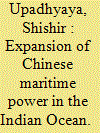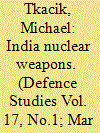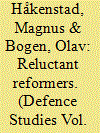|
|
|
Sort Order |
|
|
|
Items / Page
|
|
|
|
|
|
|
| Srl | Item |
| 1 |
ID:
151397


|
|
|
|
|
| Summary/Abstract |
This paper examines the ongoing expansion of China’s maritime power in the Indian Ocean region and analyses its potential impact on the extant balance of Sino-Indian maritime power in the region. It posits that the expanding Chinese maritime power in the Indian Ocean could seriously challenge India’s geostrategic advantage in the near future and that India can no longer take for granted its strategic location at the centre of the Indian Ocean nor the strength of its historical ties with the various regional states. It further argues that the current Indian maritime strategy for the Indian Ocean region, to be the “net security provider” for the entire region, is unsustainable and thus needs to be reviewed and rebuilt leveraging the geographic advantage enjoyed by India over China in the Indian Ocean.
|
|
|
|
|
|
|
|
|
|
|
|
|
|
|
|
| 2 |
ID:
151398


|
|
|
|
|
| Summary/Abstract |
This article argues India is laying the foundation to move away from “no-first-use” (NFU) as its nuclear weapons employment policy. Since the inception of its nuclear weapons program, India has claimed NFU as the centerpiece of its nuclear strategy. But India has a history of developing foundational changes to its nuclear weapons program before such changes actually occur. For example, the infrastructure of India’s nuclear weapons program was already being created in the 1950s under the guise of civilian nuclear power. Similarly, the weaponization of India’s program, which did not officially occur until after the 1998 tests, had its genesis in far earlier decisions. A close examination of trends in India’s nuclear weapons production complex, its delivery systems, and its command and control complex all lead to the conclusion that India is laying the groundwork for more flexible employment options, up to and including first use. This article does not argue such a decision has been taken. Rather, it argues the underpinning is in place to allow for a move to more flexible options, perhaps very quickly, at some point in the future. This could occur during crisis or it could occur incrementally over time.
|
|
|
|
|
|
|
|
|
|
|
|
|
|
|
|
| 3 |
ID:
151394


|
|
|
|
|
| Summary/Abstract |
It is commonly assumed in the foreign policy literature that narratives are uniquely persuasive and thus integral to obtaining public support for war. Yet, empirical research on “strategic narrative” is often vague on both the concept of narrative and how it persuades. Moreover, the stories publics use to interpret war are rarely examined. This paper offers a novel approach to studying “from the ground up” the war stories of individual British citizens. It examines public interpretations of war through emplotment: the way people select and link events to create a coherent story. Examining the wars people include and those they silence, it illustrates how a diverse range of citizens morally evaluates Britain’s military role, be it as a Force for Good, a Force for Ill or a country Learning from its Mistakes. In doing so, the paper offers an alternative methodological approach to studying how individual citizens understand war.
|
|
|
|
|
|
|
|
|
|
|
|
|
|
|
|
| 4 |
ID:
151395


|
|
|
|
|
| Summary/Abstract |
The Norwegian Armed Forces has seen extensive reforms since the early 1990s. It has been changed from a large, conscription-based, reservist-dominated territorial Defense force to a smaller, more proficient, and flexible force. However, this process has been far from linear, and to this day the Norwegian Armed Forces retains significant elements of its organizational and cultural cold war heritage. We argue that national security concerns, domestic politics and financial constraints have played the main role in shaping the reform of the Armed Forces. This argument gives an alternative to explanations offered by previous research, which has tended to emphasize the role played by international influences, such as the NATO operations in the Balkans and Afghanistan, as well as NATO and US reform initiatives. While external factors undoubtedly have shaped the direction and tempo of the reforms, our findings point to long-standing structural and financial imbalances as the key explanation of the current structure of the Norwegian Armed Forces.
|
|
|
|
|
|
|
|
|
|
|
|
|
|
|
|
| 5 |
ID:
151396


|
|
|
|
|
| Summary/Abstract |
Turkey has been investing in its national defence industrial base since the 1980s. As with other developing countries, Turkey’s motivations for investing in national defence industries can be boiled down to the pursuit of defence autarky, economic benefits and international prestige. However, after 40 years of investment, Turkey is unable to reach the primary goals of defence industrialisation. We argue that three factors are important to understanding Turkey’s persistence in these primary goals. First, Turkey believes that there is an overall improvement in its defence industrial capabilities and the goal of autarky is still reachable. Second, increased defence exports support the belief that Turkish defence industries have become sustainable and the trend will continue in the future. The third reason, perhaps most important of all, has to do with the domestic political gains of defence industrialisation: the AKP uses defence industry and indigenous weapon systems for prestige and, therefore, garners broader support.
|
|
|
|
|
|
|
|
|
|
|
|
|
|
|
|
|
|
|
|
|